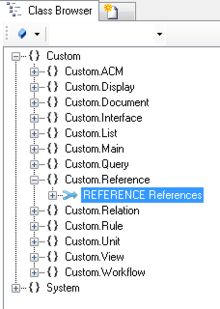Difference between revisions of "HowTo:Create a new Reference"
| Line 1: | Line 1: | ||
| − | + | A [[Reference]] is for a 1:n compound. On a reference, no further data can be stored. | |
| − | # Navigate to the MetaClass ''REFERENCE''<br/>[[File:UI_reference_01.PNG|220 px|alt=Reference|Reference]] | + | # Navigate to the [[MetaClass]] ''REFERENCE'' via the ''[[Class Browser]]''<br/>[[File:UI_reference_01.PNG|220 px|border|alt=Reference|Reference]] |
| − | # Create a new instance | + | # Create a new instance using the ''[[Bulk Editor]]''<br/>[[File:UI_reference_02.PNG|880px|border|alt=Reference|Reference]] |
| − | + | # Set at least name, description and reference ''REFERENCE'' | |
# Save the changes | # Save the changes | ||
| + | # In the next step must be [[Create a new MetaProperty#REFERENCE|Create a new MetaProperty]]. | ||
[[Category:How-To]] | [[Category:How-To]] | ||
[[Category:UBIK Studio]] | [[Category:UBIK Studio]] | ||
Revision as of 09:54, 18 November 2013
A Reference is for a 1:n compound. On a reference, no further data can be stored.
- Navigate to the MetaClass REFERENCE via the Class Browser
- Create a new instance using the Bulk Editor
- Set at least name, description and reference REFERENCE
- Save the changes
- In the next step must be Create a new MetaProperty.


